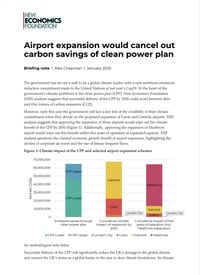Airport expansion would cancel out carbon savings of clean power plan
Proposed airport expansions a key test for this government's climate commitment
21 January 2025
The government has set out a stall to be a global climate leader, with a new ambitious emissions reduction commitment made to the United Nations at this year’s Cop29. At the heart of the government’s climate ambitions is the clean power plan (CPP). New Economics Foundation (NEF) analysis suggests that successful delivery of the CPP by 2030 could avoid between 46m and 65m tonnes of carbon emissions (CO2).
However, early this year this government will face a key test of the credibility of their climate commitment when they decide on the proposed expansion of Luton and Gatwick airports. NEF analysis suggests that approving the expansion of these airports would wipe out the climate benefit of the CPP by 2050 (Figure 1). Additionally, approving the expansion of Heathrow airport would wipe out this benefit within five years of operation at expanded capacity. NEF analysis questions the claimed economic growth benefit of airport expansion, highlighting the decline of corporate air travel and the rise of leisure frequent flyers.
Figure 1: Climate impact of the CPP and selected airport expansion schemes
Successful delivery of the CPP will significantly reduce the UK’s damage to the global climate and cement the UK’s status as a global leader in the race to slow climate breakdown. Its climate benefit derives from the emissions saved by achieving a zero-carbon electricity system in 2030 instead of the 2035 date targeted by the previous government. However, the significant effort put in to achieving the CPP could easily be wasted if other decisions are not made wisely.
Air travel causes very significant climate damage. Even under the previous government’s Jet Zero Strategy, which is widely considered to be extremely optimistic about the scope for emissions reduction in aviation, there is expected to be very significant climate damage from air travel remaining in 2050. As a result, even after considering efficiency savings and alternative fuels, the expansion of Luton, Gatwick, and Heathrow airports would create very significant climate damage.
Only a minority of the emissions created by the proposed airport expansions will be captured within the UK’s current legal emissions accounting framework. Currently, both international inbound/arriving flight emissions and all non-carbon emissions are outside of the framework. Government guidance is clear that these major sources of climate damage should still be considered in the impact assessment and they are factored into NEF’s analysis.
Image: iStock
Topics Climate change Transport







